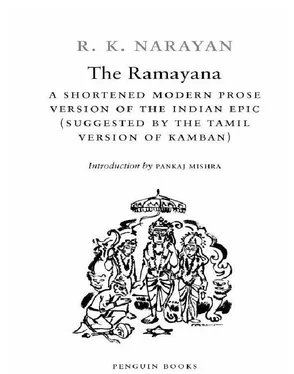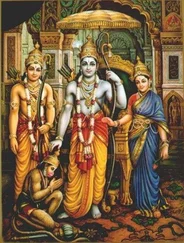Махариши Вальмики - The Ramayana
Здесь есть возможность читать онлайн «Махариши Вальмики - The Ramayana» весь текст электронной книги совершенно бесплатно (целиком полную версию без сокращений). В некоторых случаях можно слушать аудио, скачать через торрент в формате fb2 и присутствует краткое содержание. Жанр: Старинная литература, на английском языке. Описание произведения, (предисловие) а так же отзывы посетителей доступны на портале библиотеки ЛибКат.
- Название:The Ramayana
- Автор:
- Жанр:
- Год:неизвестен
- ISBN:нет данных
- Рейтинг книги:3 / 5. Голосов: 1
-
Избранное:Добавить в избранное
- Отзывы:
-
Ваша оценка:
- 60
- 1
- 2
- 3
- 4
- 5
The Ramayana: краткое содержание, описание и аннотация
Предлагаем к чтению аннотацию, описание, краткое содержание или предисловие (зависит от того, что написал сам автор книги «The Ramayana»). Если вы не нашли необходимую информацию о книге — напишите в комментариях, мы постараемся отыскать её.
The Ramayana — читать онлайн бесплатно полную книгу (весь текст) целиком
Ниже представлен текст книги, разбитый по страницам. Система сохранения места последней прочитанной страницы, позволяет с удобством читать онлайн бесплатно книгу «The Ramayana», без необходимости каждый раз заново искать на чём Вы остановились. Поставьте закладку, и сможете в любой момент перейти на страницу, на которой закончили чтение.
Интервал:
Закладка:
This worry at the back of Dasaratha’s mind about Bharatha’s claim turned out to be a valid one. Though Bharatha was away, his cause and claim were espoused by his mother Kaikeyi so energetically that it brought on disaster and changed the whole course of events in Rama’s life. It came about thus. Kooni, a freak and hunchback (and nicknamed thus on account of her deformity), was the favourite of the King’s favourite wife, Kaikeyi. On this particular day she climbed to the top terrace of Kaikeyi’s mansion to view the city, and noticed the festoons and lights, and asked herself, “What are they celebrating today?”
When she went down, inquired, and found out the cause of the celebrations, she became excited, bit her lips, and muttered, “I will stop it.” She hurried to Kaikeyi’s chamber and shouted at her mistress, who was resting, “Is this the time to sleep? Wake up before you are ruined.” Kaikeyi opened her eyes and cried, “You! Where have you been? What is troubling you?”
“Your impending fate,” replied Kooni.
Kaikeyi was curious, but still without rising she said, “Kooni, something seems to be the matter with your health. Won’t you call the physician and see that he sets you right?” She laughed and said, “Now calm down, sit near me, and sing me a song.”
Kooni said sharply, “Do you know that beauty and youth are your only source of strength? And you owe your position as the queen of a world conqueror to your beauty?”
“Do I?” asked Kaikeyi, still in a playful mood.
“But both beauty and youth are like a wild stream, which, while rushing down the mountainside, crushing flowers and leaves, holds you in a spell. But how long does it last? Very soon it passes, and in its place you have only the sandy bed. . . . It’s only a question of time. When you are old and the cheeks sag, you will be a nobody, pushed aside with the back of your lover’s hand. You will be at other people’s mercy.”
“Bring that mirror, let me see why you speak thus. Have I grown old today?” And she laughed.
“Not old, but smug, and running into danger. Doom hangs over your head.”
Now Kaikeyi felt disturbed. “If you cannot talk plainly, go away; and come later. You are somehow bent upon irritating me today.”
“Don’t waste your youth and beauty, which hold your husband in a spell. Before that’s lost, get your husband to help you and save yourself. Get up and act before it’s too late.” Kaikeyi now sat up anxiously. Satisfied with the effect of her remarks, Kooni declared, “The King has cheated you. Tomorrow he is crowning Rama as the King of Ayodhya and retiring.”
Kaikeyi got up, exclaiming, “Wonderful! Wonderful! Here is your reward for the good news you bear.” She took off her necklace and threw it on Kooni’s lap. Kooni received it and laid it aside. Now Kaikeyi said, “For the excellence of your news you deserve more. Tell me what you wish and you shall have it.” This really provoked Kooni to cry out, “I said Rama is becoming the king of Ayodhya, and you behave as if I had said your son Bharatha . . .”
“I make no distinction between the two. It’s all the same to me. Rama is the one who was born to it, and as a mother it makes me proud and happy. . . .”
“You, Rama’s mother!”
“Yes, don’t you know that one in Rama’s position should count five mothers: the one who has borne him, a stepmother, a father’s sister, an elder brother’s wife, and the wife of the guru—all these have equal rank as mother. You understand why I feel happy about Rama? I adore him. I’m his mother as well as Kausalya is. And so make no mistake that I’m a fool and do not understand things!” At which Kooni beat her brow with her palms with such force that Kaikeyi said, “You have hurt yourself—a contusion big as my thumb!”
“I’d be happy if I killed myself or had not been born at all, rather than see all the treachery that goes on in this world,” wailed Kooni. “My sorrow, now, is for you, the doom that overhangs you. It rends my heart to see the carefree innocence of your heart—it reminds me of the little dove flitting at the jaws of a wildcat.”
All this amount of talk prepared Kaikeyi’s mind to be receptive to what Kooni said next: “Your husband, the Emperor, is very cunning; he is capable of great trickery, unsuspected by you; great depths of trickery indeed, unbeknown to you, such depths as you cannot suspect even in your wildest dream. You and he are unequals. He was old enough to be your father when he asked for your hand; and your father refused the proposal, of course. But the old bridegroom was intoxicated with the spectacle of your beauty and youth, and was prepared to promise anything. He vowed to your father that he’d make the son borne by you the heir to the throne. I was the only one who overheard it. No one else knows about it. Now when the time came, the old man advised Bharatha sweetly: ‘Why don’t you go and spend a few days with your grandfather? He has been asking you so long.’ And forthwith got him and his inseparable brother Sathrugna out of the way. He would have sent you away too—but for the fact that he can’t survive even a single day without your caresses! Your charms are still potent. You will have to save yourself with their aid before it’s too late. . . . Rama should not be enthroned tomorrow.”
“Why not? The King may have his own reasons; and I see no difference between Rama and Bharatha.”
“Do you know how people can change overnight? Tomorrow this time, he will be a different Rama. His only aim will be to stay long and strong in his seat, and to achieve it he will remove all hurdles. The chief hurdle will be Bharatha, who may assert his claim any time and win it by public support. Rama will banish him or break him down or behead him. You will no longer be a queen, but an ex-queen, of an ex-king, and will probably be reduced to the status of being the handmaid of the queen mother Kausalya.”
“Never! how would she dare!” cried Kaikeyi involuntarily. “Let her try!”
“By this time tomorrow, it could happen; it’s bound to happen sooner or later.” Thus Kooni had brought Kaikeyi to the brink of panic, before spelling out the remedy: “Do you remember that Dasaratha was saved by you at one time, and there are two ancient promises of his to be fulfilled? Leave alone his promise to your father: you are not concerned with it. But hold on to the two promises given to you. Demand first the banishment of Rama to the forests for fourteen years, and secondly the crowning of Bharatha in his place immediately.”
“Impossible conditions; you must be drunk.”
“No, quite practical, only go about it this way. . . .”
Thus it happened that when Dasaratha sought Kaikeyi’s company, as was his wont, he did not find her in her chamber or the garden. A maid told him, “She is in the kopa gruha. ”
“Why, why there?” He had had a tiring day. He had had meetings again and again with his chief spiritual mentor, Vasishtha, and his chief minister, Sumanthra, going into details of arrangements for the next day’s ceremonials and festivities. “I will be the host for the whole city tomorrow,” he had said; “let no one feel any want.” Again and again he had mentioned how every home and street and building should be decorated and brightened; and how musicians, dancers, and entertainers should be ready at the assembly hall before the dawn, and how the state elephant and horses and chariots should move in the procession of the newly crowned king; and named the streets through which the procession should pass. “People would love to see Rama on the throne and watch him in a procession. Every man, woman, and child must have a chance to look at him. Tell those conducting the procession to move slowly but not so slowly as to tire Rama. . . .” He had gone into every detail of the ceremonies. Exhausted, in the evening, he sought Kaikeyi’s company for relaxation.
Читать дальшеИнтервал:
Закладка:
Похожие книги на «The Ramayana»
Представляем Вашему вниманию похожие книги на «The Ramayana» списком для выбора. Мы отобрали схожую по названию и смыслу литературу в надежде предоставить читателям больше вариантов отыскать новые, интересные, ещё непрочитанные произведения.
Обсуждение, отзывы о книге «The Ramayana» и просто собственные мнения читателей. Оставьте ваши комментарии, напишите, что Вы думаете о произведении, его смысле или главных героях. Укажите что конкретно понравилось, а что нет, и почему Вы так считаете.












